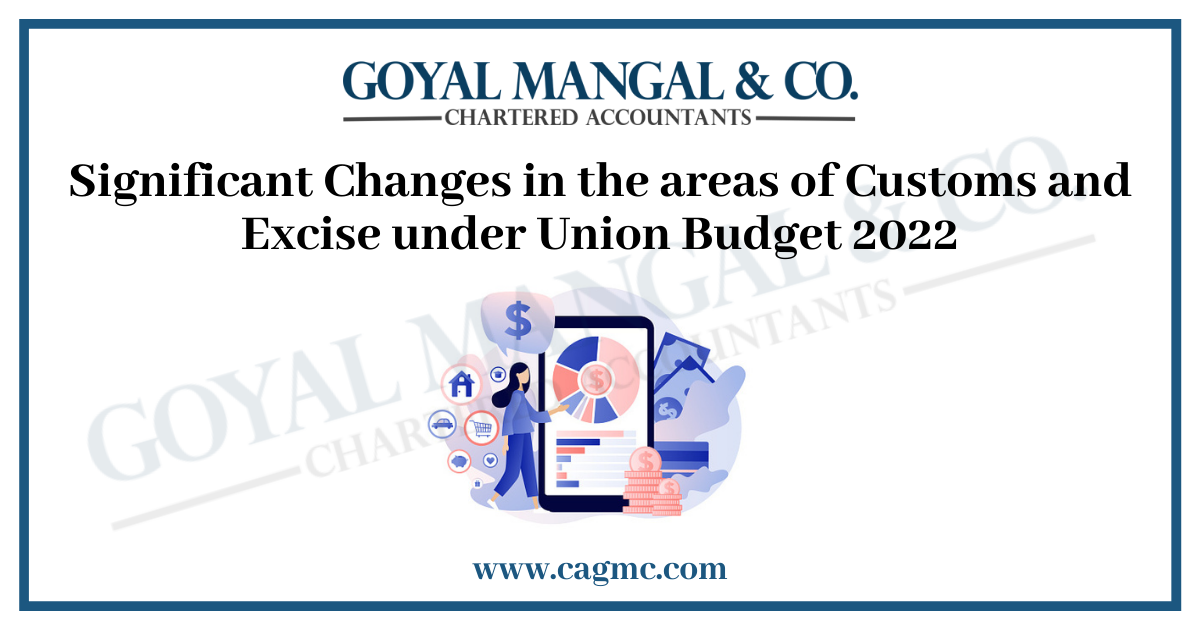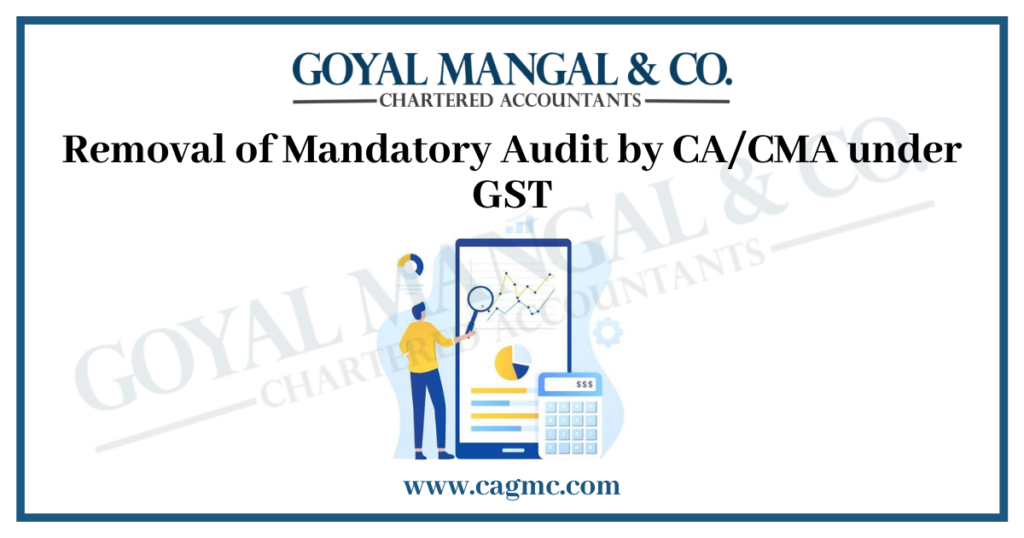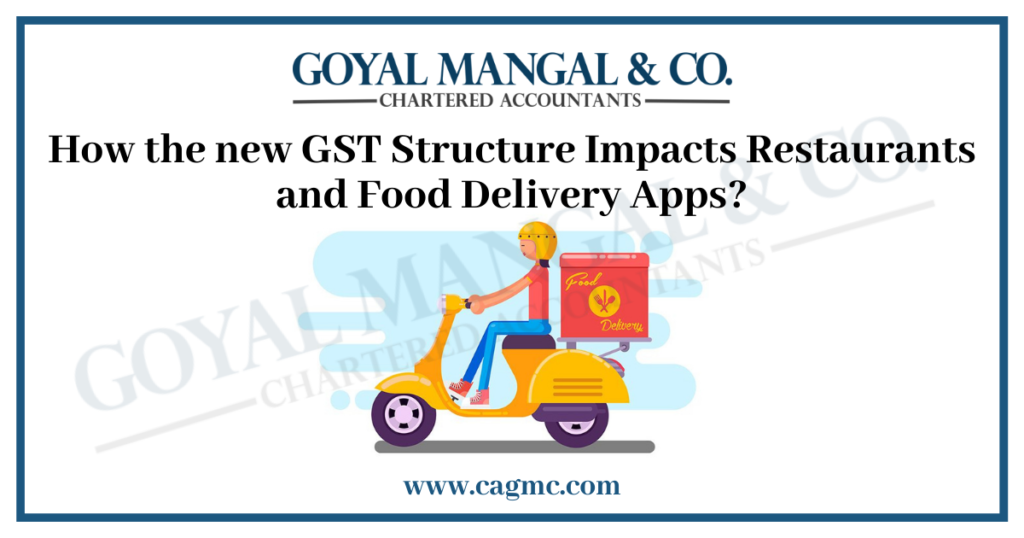
On Tuesday, February 1st, 2022, the Union Budget 2022 was presented to Parliament. Finance Minister Smt. Nirmala Sitharaman proposed many reforms in Customs, Central Excise, GST law, and rates while presenting the second digital Union Budget. Unless otherwise noted, all changes in duty rates will take effect on the 1st/ 2nd February 2022 at midnight. The other legal changes would take effect only once the Finance Bill of 2022 is enacted, or on May 1, 2022. Let’s get deeper knowledge about Changes under Custom and Excise in Union Budget 2022.
Changes suggested in Customs
- Adjustments are expected in the form of a reduction in the rate of duty on imported items. Basic Customs duty on copper ores and concentrates is scheduled to be decreased from 2.5 percent to nil. This will bring relief to the country’s iron and steel industry. Customs duty on replacement parts used in the manufacture of medical equipment, which is currently subject to an inverted duty structure, should be decreased as well.
- Similarly, the rate of duty on crucial raw materials used by aluminium manufacturers is likely to reduce. Gold’s basic customs charge is also scheduled to be decreased from 7.5 percent to 4%.
Notifications and dates for changes in Customs
On, February 1, 2022, the Finance Minister introduced the Finance Bill 2022 in the Lok Sabha. The Finance Bill of 2022 proposes changes to Customs, Central Excise, GST law, and rates.
The following notifications are being issued to regulate effective rates of duty:
| Notification no. | Date | |
| Customs Tariff | 02/2022-Customs to 15/2022-Customs. | 1st February, 2022 |
| Customs (Non-Tariff) | 07/2022-Customs (N.T.) | 1st February, 2022 |
| Customs (ADD) | 05/2022-Customs (ADD) to 07/2022- Customs(ADD) | 1st February, 2022 |
| Customs (CVD) | 01/2022-Customs(CVD | 1st February, 2022 |
| Central Excise | 01/2022-Central Excise | 1st February, 2022 |
| Central Excise (N.T.) | 01/2022-Central Excise (N.T.) | 1st February, 2022 |
| Circular (Central Excise) | 1082/03/2022-CX | 1st February, 2022 |
| Circular (Customs) | 3/2022-Customs | 1st February, 2022 |
Unless stated, all modifications in duty rates will take effect on the 1st/ 2nd February 2022 at midnight. In relation to clause 97 (a) of the Finance Bill, 2022, a declaration has been issued under the Provisional Collection of Taxes Act, 1931, so that the amendments proposed therein take effect from midnight on the 1st February/ 2nd February 2022. The other legal changes would take effect only once the Finance Bill of 2022 is enacted, or on May 1, 2022.
Significant adjustments (including cesses) under Customs and Central Excise Duty
- Changes in customs duty rates: changes in duty rates, tariff rates, the exclusion of certain exemptions and adjustments to certain exclusions, conditions to exemptions, and explanations relating to the applicability of SWS, among other things.
- Tariffisation: To simplify the tariff system, an extensive effort was carried out. The Customs Tariff Act’s Tariff (First) Schedule is being updated to include unconditional concessional rates that have been imposed through various announcements. These modifications to the tariff rate will take effect on May 1, 2022. As a result, with effect from May 1, 2022, the appropriate entries in the concerned notices shall be omitted. The tariff rates on such items will then be governed by the 1975 Customs Tariff Act’s First Schedule. It should be noted, however, that certain Customs Tariff rate modifications are effective immediately as a result of a declaration made under the Provisional Collection of Taxes Act.
- Changes to the Customs Act, the Customs Tarff Act, and the Rules promulgated hereunder
- The concept of a “proper officer” is being changed, and officers from the DRI, Audit, and Preventive formation are now officially included in the category of Customs officers.
- In some circumstances, as the Board may define, concurrent jurisdiction is provided.
- In circumstances involving short levy/payment of duty, erroneous refunds, and so forth, explicit provisions are being created to clarify jurisdiction.
- The assignment of functions to Customs officers is explicitly stated.
- Enablement provisions are also being included to combat the threat of systemic undervaluation.
- The procedures for Advance Ruling are being streamlined.
- Unauthorized release of import or export data would be made illegal under the Customs Act, according to a new clause.
The Import of Goods Concessional Rate of Duty (IGCR) Rules, 2017, has been completely amended in a major trade facilitation step. The entire process is being automated from beginning to end; multiple forms are being standardized, and any transaction-based permissions or intimations are being eliminated. Under these standards, periodic statements must also be submitted via a single platform.
What are the amendments made in Customs Traffic Act, 1975?
The First Schedule to the Customs Tariff Act shall––
- Be amended in the manner specified in the Second Schedule to the Finance Bill, 2022, with effect from February 2, 2022, to revise the rates in respect of certain tariff items
- Amended in the manner specified in the Third Schedule to the Finance Bill, 2022, with effect from May 1, 2022, to harmonise certain entries with the Harmonised System of Nomenclature to create new tariff lines in respect of certain tariff items.
Amendments in Custom Rules
- Automate the entire procedure from beginning to end. The requirement of electronically providing all relevant details through a shared gateway is stated in the Rules.
- Standardizing and notifying the numerous forms that need electronic submission of information.
- By taking use of the electronic nature of such submissions, transaction-based clearances and intimations are no longer required.
- A Monthly Statement is being proposed for effective monitoring of the usage of products for the stated purposes, which will be filed by the importer on the Common Portal.
- The importer has the option of paying the applicable duties and interest on a voluntary basis using the Common Portal.
Rates of Additional Excise Duty on Unblended Petrol and Diesel
To encourage the blending of Motor Spirit (Petrol) with ethanol/methanol and High-Speed Diesel with bio-diesel, an extra Basic Excise Duty of Rs. 2 per liter will be imposed on Petrol and Diesel sold to retail consumers without blending from October 1, 2022.
Duty concessions for bona fide exporters
A plan is being created for bona fide exporters on duty-free imports for use in goods intended for export, based on end-use monitoring and the need of exporting value-added items manufactured using inputs imported under specific exemptions within a 6-month period. The importer must follow the method outlined in the IGCR Rules.
Conclusion
In contrast with the above blog, we can conclude that there is no doubt that the changes proposed in the Budget touch every individual residing in this country, whether rich or poor, employers or employees, sellers or consumers. The policies and framework implemented in the Budget set the roadmap for the economy for at least the coming financial year.


